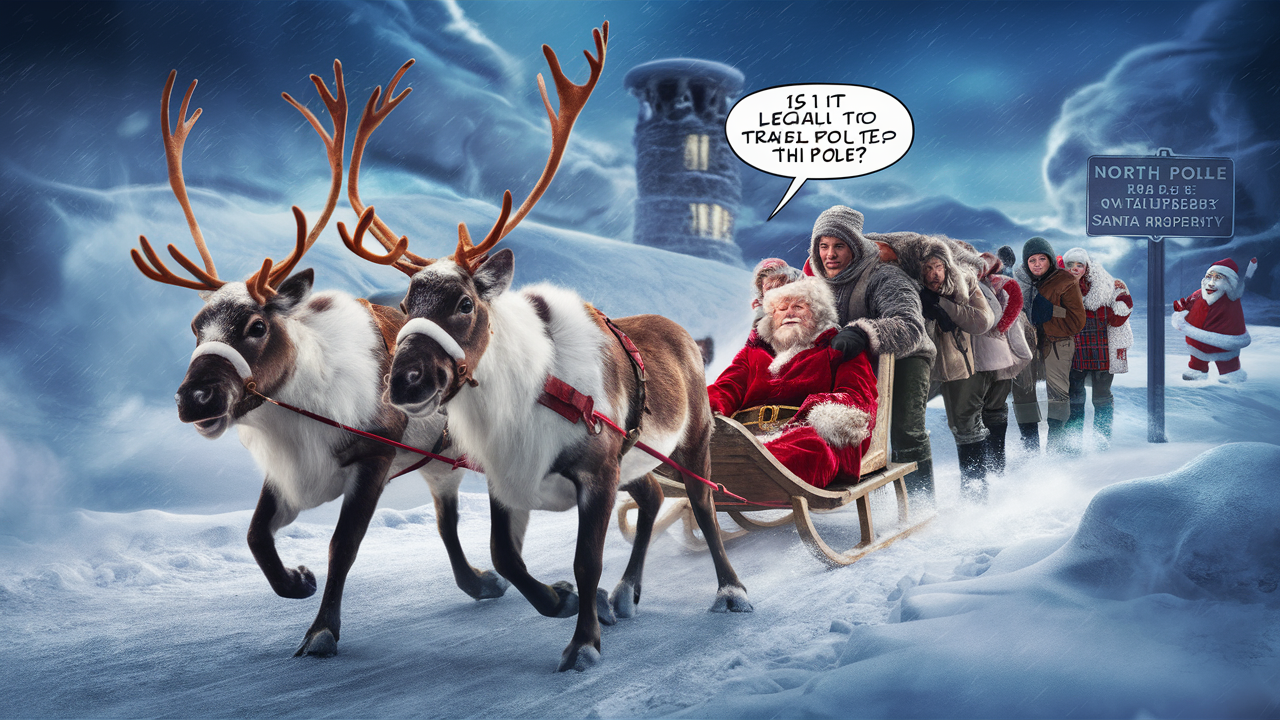Is It Legal To Travel To The North Pole?
The North Pole is one of the most hostile areas on the planet, yet it remains to be an attraction for travelers and explorers. But if you are planning on organising your own expedition to the northernmost point on the planet, you may be asking yourself the following question- is it legal to travel to the North Pole? The short answer is yes, it is legal for ordinary citizen to travel to the geographic North Pole. But the practical issues of getting there in the first place make it a fearsome trial that only the bravest of souls can possibly attempt.
It is important to understand that the North Pole is on the Arctic Ocean and the ice upon which it rests is constantly moving. Actually, there is no actual ground to be talked about; only long planes of ice that constantly change their positions on the Arctic ocean. This presents fairly obvious problems when attempting to create any sort of sustained occupation or base there. There have been scientific research stations created and placed right on the North Pole in the past, however, they have been made temporary due to instability of the area.
Still, no country can own the North Pole or the area around it, although the fact that getting to that place is so challenging means that there is no danger of free-for-all tourists and developers swarming the area in the near future. Countryside occupying the nearest points to the North Pole are the territory of Russia, Canada, Denmark, Norway, and the United States; however, the North Pole per se is, at least theoretically, located in the high seas.
As far as this author is aware, for the average Joe who does not own an icebreaker or an aircraft designed for polar use, the best way to currently travel to the North Pole is to be part of an arctic expedition tour. Several commercial adventure travel companies organize North Pole tours every year to a limited number of people willing to endure the cold and unpredictable climate for adventurous and polar tourism.
Today’s most frequent method of transportation is the flying to the North Pole on special Russian helicopters outfitted with skis to allow them to land on the ice. From the Russian archipelago of Svalbard people are transported by helicopters to a temporary ice basecamp: here they can step out of the helicopters and be on the sea ice at the latitude of 90° north – this is the North Pole! Exploring the camp on foot in the morning and other ceremonial activities like the traditional polar plunge in the Arctic Ocean, they are airborne a few hours later and return to Svalbard.
Therefore, to answer the question, it is indeed lawful to go to the top of the world and take a stand on the scale at the point 0° longitude. If you can make it there, you won’t get arrested for trespassing. However, because the North Pole region is virtually unclaimed territory, you accept all liability and there are no regulatory safeguards, assurances, or search and rescue services. The travelers have to embark on the private guided tours on their own expense and risk. However, for the pure enthusiast, undertaking North Pole journey is one of the greatest life experiences and achievements!
Read More:
Do You Need a Visa to Travel to Europe?
How Far Do Turkeys Travel in One Day?
How To Best Travel from Vienna to Budapest?
How To Travel to New York City Cheap?
Is Travel Protection Worth It?
What Is Electronic Travel Authority?
FAQ
Is it legal to travel to the North Pole?
Yes, it is legal, but it requires careful planning and consideration of international regulations.
What permits are needed to visit the North Pole?
Generally, no specific permits are required, but travel through Arctic waters may require permissions depending on the route and mode of travel.
Can anyone travel to the North Pole?
While technically anyone can attempt to reach the North Pole, it typically requires joining an expedition or tour due to extreme conditions.
What are the legal implications of claiming land at the North Pole?
No country has sovereignty over the North Pole, but claims may be made based on territorial waters and continental shelf agreements.
What are the safety regulations for traveling to the North Pole?
Travelers should be aware of safety protocols and environmental protections, as the area is fragile and dangerous.
Recent Blog
- Greece Travel Guide: Best Places to Visit
- Best Place to Visit in Hawaii: Top Destinations Revealed
- Hidden Gems: The 13 Most Beautiful Places on Earth
- Top Activities: Things to Do in Chicago
- Ultimate Guide: Top Things to Do in Nashville
- Best Place to Visit Europe: Top Destinations
- How to Travel Cheap in Europe: Budget-Friendly Tips and Tricks
- Can You Travel When Pregnant?
- Can You Travel North Korea?
- Can North Koreans Travel?

